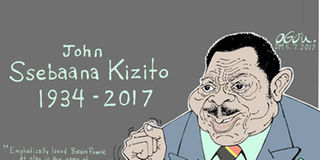Ssebaana’s death should wake up DP to take its place in modern Uganda

John Ssebaana Kizito. Cartoon by Atukwasize Chris Ogon
What you need to know:
- Rest in peace Ssebaana Kizito.
The past several months have been the hardest single spell for members for the rump Democratic Party. DP has like the children of Israel been at a crossroads for a longtime. Between December and now, the party has buried a former legal advisor, a former secretary general, a former deputy secretary seneral, its first national chairman and now, its president general has also passed on.
In their wide and varied service to DP and Uganda, they all made it in good and bad times. DP is like a religion, the party faithful are always steadfast even where this faith is tested by politics - a numbers game. Mzee Boniface Byanyima, all the way up to the end, would still probe you on how party members were faring in their local and national races completely missing the food on his plate.
Visiting Matia Nsubuga at his home, half of the calls he took were checking on party members in Arua, Mbale and other places organising meetings. Ssebaana was one of the first politicians of the modern era whose campaign style resembled a fair. In 1980-1985, many events in his constituency were held at Clock Tower Sports Ground, which unfortunately, has degenerated into an eye-sore.
Boniface Byanyima’ s Parliament in 1962 kicked off with 24 DP legislators and ended with just four MPs in 1971. At the time, the Opposition was no longer officially recognised in Parliament. Ssebaana’ s Parliament in 1981 kicked off with 51 MPs, the highest ever opposition numbers in Parliament by an opposition party and ended with 32 MPs still higher than FDC membership in Parliament today. Yet you would think from later propaganda by NRM and FDC that the entire party had crossed to UPC.
It was only one region Busoga that crossed enmasse and many more DPs were locked out of parliament by the courts. Matia Nsubuga’s time in Parliament was even leaner, just eight DP MPs sat in Parliament during his tenure in his first term, that it seemed like a fortune 10 years later when DP lawmakers increased to 13 and another two DP-leaning MPs.
For an opposition party to last beyond its 60th birthday, it’s just behind ANC founded in 1912, which turned 100 recently.
There are a lot of hard feelings between three main groups in the party; first is the headquarter group, the good DP that fairly or unfairly has been attacked for politics of moderation.
The good DP for better or worse are trudging on at the headquarters and in 2016, returned a single member to EALA.
The second group are the bad DP, who fairly or unfairly are attacked as political mistresses to FDC in the same way as their good DP counterparts. Each of these groups looks upon each other as spoilers.
The third group are the national membership mostly toiling in exile. They are like Christians waiting for the Pope to appoint new bishops and priests. The boundaries between these groups are not clear and fast, as these divisions have always been around.
In the 1960s, Ben Kiwanuka fell out with Basil Bataringaya, who headed DP in Parliament. In the 1980s, many DP party members went to the bush criticising those who stayed, yet many who stayed still stealthily took up arms. Yafesi Sabiiti, Anthony Sekweyama, Gerald Sendaula and other MPs who were executed by both UPC and NRA did not go to the bush.
Ssebaana is lying dead and motionless in a casket, but this is no ordinary funeral. Like the Mormons, we should only be saying he has retreated to a higher universe to join the party founders who fought so hard for a reasonable centrist political party that represented ordinary Ugandans.
If UPC and NRM were to be the party of the mighty, DP was the party of ordinary shopkeepers, farmers and teachers. Ssebaana’s favourite refrain was that DP was a party of brainpower.
Mr Ssemogerere is an Attorney-at-Law and an Advocate. [email protected]


